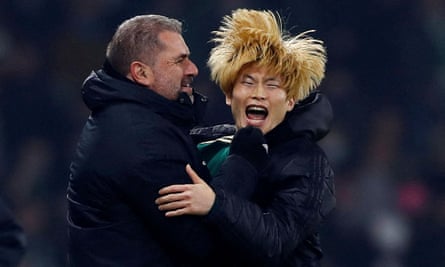‘It is good for us that the owner is Thai,” said Teerasil Dangda not long after he arrived in England in 2007, one of three players from the Land of Smiles to sign for Manchester City. Sven-Göran Eriksson was also grinning, albeit with some bemusement, as he lined up alongside the striker, Suree Sukha and Kiatprawut Saiwaeo, all holding up blue shirts that they would never wear on the pitch. If it was good for Teerasil, now a legend of Thai football, who said he learned a lot in his short time out west, it could have been better. Instead of being brought to Europe by his country’s former prime minister Thaksin Shinawatra, he could have been signed by Ange Postecoglou.
Celtic’s manager has brought another Asian trio to a British club, and Daizen Maeda, Reo Hatate and Yosuke Ideguchi, all Japanese, should have more impact at Celtic than their Thai predecessors did at City. The Australian, who led Yokohama F. Marinos to the 2019 J League title, knows exactly how good these players are.
In the short term that spells bad news for Celtic’s rivals. Scottish clubs yet to get to grips with the prolific Kyogo Furuhashi, who has scored 16 goals since arriving in the summer from Vissel Kobe, may groan at the thought that Postecoglou has brought in more Japanese talent.
These are three of the best players in Japan, home to one of the best leagues outside the big five of Europe. Hatate, a spiky son of a baseball player, has stood out for Japan’s dominant team, Kawasaki Frontale, and was named in the 2021 J League season XI. The 24-year-old has played only two years of professional football, winning two titles, and has admitted it may take time to get used to the language, culture and food in Glasgow. He is flexible enough to manage. Postecoglou has described him as an attacking midfielder and understandably so given his technique and eye for a pass, but Hatate can play in various positions.
Maeda’s speed, physicality and clinical finishing – he was the league’s joint top scorer last season for Yokohama, the club Postecoglou left in June – should quickly endear him to fans.
Ideguchi may have the hardest time winning over the doubters and not only because he is a defensive midfielder appreciated more for doing the simple things well and rarely giving away the ball. He and Postecoglou say he has unfinished business in Europe after he signed for Leeds in 2018 and then, like that Thai trio 11 years earlier, left England without playing a competitive game. The first move to Europe came too soon for the then 21-year-old. He is wise enough to know that he will be damned if he does well, with those from outside arguing it is proof of the Scottish league’s weakness, and damned if he doesn’t.

No prizes for guessing what Rangers fans will want to happen, and, although they may not be too pleased should this new trio shine, it would be good for Scottish football. More Japanese talent would follow. In 2013 Arsène Wenger, who spent 18 months in charge of Nagoya Grampus before heading to Arsenal, told everyone that the J League was worth a look: “I find that a new market that is very interesting and very competitive is the Japanese market. Look at the number of Japanese players who play now in Germany for example.”
That really took off in 2010. There had been Japanese players in Germany before a 21-year-old Shinji Kagawa signed for Borussia Dortmund but the numbers increased after his stunning success. There were 12 in the Bundesliga by 2014; only Switzerland, Austria and Brazil were more heavily represented abroad.
Something similar could happen in Scotland. As in Germany, some will come, shine and be sold to richer leagues for big money in the manner of Kagawa and Shinji Okazaki, others will stay for years such as Makoto Hasebe and some will, like Kazuki Nagasawa, return home fairly quickly.
There will be huge interest in Japan at seeing four compatriots in action for a storied European club. As always, translating interest into hard cash is a challenge but it may not matter too much given that the new signings hardly broke the bank anyway. There was consternation in Japan at how cheap the deals have been, with the three commanding a total of about £3.5m in another example of J League clubs being only too happy to virtually stand aside and wave their best players through to Europe.
Celtic won’t care about that, the only downside being that should these three play to their potential, Postecoglou and his employers are going to face competition next time they go shopping in Japan.
